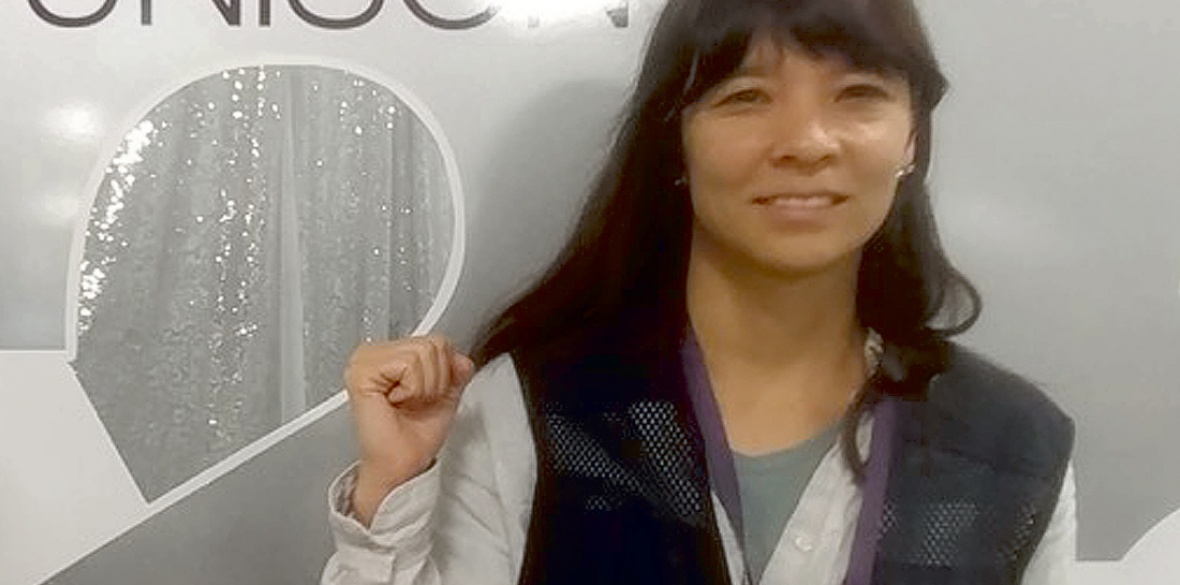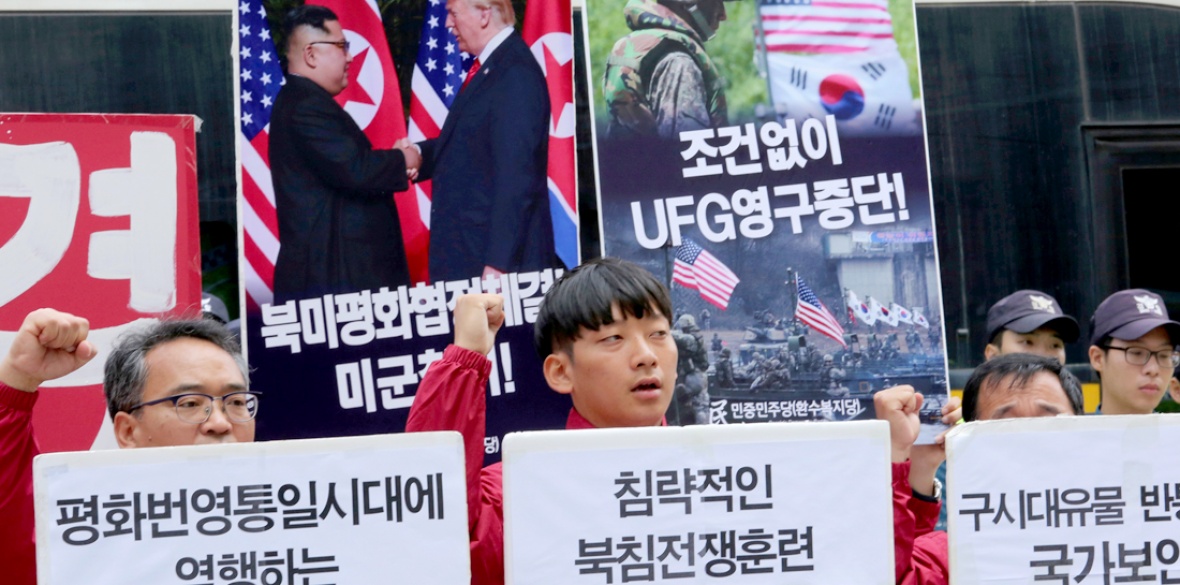This is the last article you can read this month
You can read more article this month
You can read more articles this month
Sorry your limit is up for this month
Reset on:
Please help support the Morning Star by subscribing here
Navid Shomali (NS): Please briefly tell us about your union.
Wol-san Liem: Our union organises both permanently employed and precariously employed — part-time, subcontracted etc — workers at public institutions, social care workers and public and private transport workers. We have almost 200,000 members, are affiliated to the Korean Confederation of Trade Unions and are the largest industrial union in South Korea.
NS: How much influence does the trade union movement possess in the Republic of Korea (South Korea), in terms of collective bargaining, economic policy and also more broadly in terms of the political agenda?
WSL: Trade union density is only 10 per cent in South Korea. Less than 5 per cent are part of the democratic trade union confederation KCTU.
Of course, there is higher density in certain workplaces and industries and in the public sector in general. The strength, or not, of a union in terms of collective bargaining largely depends on the particular workplace and sector. At national level, KCTU affiliates have generally exercised their influence and power on economic and other policy through the mobilising of national protests, strikes and other forms of collective action. This has, at times, had a strong impact on the direction of policy or even which government is in power.
For example, KCTU unions played a vital role in the candlelight uprising that led to the impeachment of the previous president in 2016-17. On the other hand, trade unions have never really been recognised as “social partners” by the government and capital in Korea in the way they are in many European countries, meaning that our influence is always dependent on our ability to take collective action in a given moment.
NS: What restrictions exist on the activity of trade unions and trade unionists in the work place?
WSL: Korean capital is very anti-union and uses all sorts of union busting techniques, legal and illegal, including the formation of yellow unions, dismissals and other pressure on workers, even violence. This stops some classes of civil servants, as well as “owner operators,” from forming trade unions and exercising their rights.
Limits and proscriptions are placed on what we can bargain about in the public sector and also on the right to strike per se. For example, there are high minimum service requirements that have to be met during strikes across most of the public sector, including transport.
NS: How do you view the current South Korean government? Does the current administration mark a break from past policies that might open the way for peace?
WSL: The current government of Moon Jae In has re-engaged in dialogue with North Korea, which was completely cut off under the previous president Park Geun Hye. While this is a change in position from that of the immediate predecessor in government, it has precedents under the former Kim Dae Jung and Noh Moo Hyun governments. And the current government has been quite careful not to rock the US-South Korea military alliance, thus representing a continuation from the past.
NS: How do trade unionists in South Korea view the presence of US troops on the peninsula?
WSL: It is the position of KPTU — and of our national centre the KCTU — that US troops should be withdrawn. They contribute to tensions on the peninsula and in the region and also to social problems — crime and pollution from their bases.
NS: How far has the US sought to interfere in the internal politics of South Korea?
WSL: The relationship between the US and South Korea could be called neocolonial. The South Korea government is dependent on the US for military and political support.
The US does not really need to illegally or overtly interfere as successive South Korean leaders have looked to the US for approval and support. Of course, there was more direct interference during the 1980s. In addition, the US retains command over the South Korean military in times of war.
NS: What economic interests does the US have in South Korea?
WSL: The US is South Korea’s second-largest trading partner and South Korea is the sixth-largest US trading partner. The two countries have an FTA, signed in 2007 and in effect since 2012. It eliminates tariffs on goods and provides protections for transnational corporations.
The US under Trump has been eager to gain more access to the South Korean agricultural and manufacturing markets while seeking to impose barriers on imports from South Korea of electronic goods, steel and automobiles.
In March of this year a renegotiation of the FTA led to more access for the US automobile cars industry to the South Korean market.
Large corporations such as GM and Chevron invest in South Korea.
South Korea is highly dependent on the US for foreign reserves and finance.
The US military industrial complex has a high stake in the state of military tension on the peninsula.
NS: What is the attitude of South Korean trade unionists to China’s Belt and Road initiative and its call for peaceful co-operation?
WSL: This is not an issue that has received much debate yet in the labour movement in South Korea.
In general, we are aware of Chinese capital’s investment in infrastructure throughout the Eurasian continent and of the entailing need for solidarity to ensure that workers are treated fairly in these projects.
NS: How do you assess the current initiatives of the DPRK (North Korea) government towards a demilitarisation of the peninsula?
WSL: The DPRK appears to have moved decisively to a policy of denuclearisation in exchange for security assurances, the normalisation of its relationship with the US and, eventually, Japan, with the goal of economic development.
This has been very helpful in enabling North-South and North-US dialogue, mitigating very high military tensions that persisted until the end of last year.
Moving towards a peace treaty, reduction of tensions, denuclearisation of the peninsula and disarmament is a good thing for workers and common people on both sides of the border.
On the other hand, we are concerned that the opening of the South Korean economy, North-South economic co-operation and investment from foreign private capital will lead to new social problems, including increased wealth disparity and labour “flexibility.”
NS: How dangerous is the long-term militarisation of East Asia (Asia Pacific), as has been building up over the past decade?
WSL: Conflict on the Korean peninsula is connected to militarism in the entire Asian region. Militarisation and territorial conflicts are becoming a greater risk.
We hope that achieving peace in Korea will be a starting point for building workers’ solidarity for demilitarisation throughout the region.
NS: As you are aware, Mr Trump has reneged on a number of international treaties in the past 18 months. How confident can the people of Korea be about the US respecting the outcome of any agreement reached with DPRK?
WSL: This is obviously a concern for us. It is important that movements in South Korea and the US, as well as globally, keep pressure on the US to honour its agreements.
NS: What steps should the US take to demonstrate that it is serious about the current round of negotiations with DPRK?
WSL: The US should completely stop joint military exercises with South Korea, make clear its willingness to quickly sign a peace treaty, reach a non-aggression agreement with the DPRK, make concrete promises to guarantee North Korea’s security by removal of the pre-emptive strike policy and policy of extended deterrence and make a quick and fair timeline for easing and then ceasing sanctions.
Wol-san Liem is International and Korean Peninsula Affairs director of the Korean Public Service and Transport Workers Union (KPTU)












